The best and worst changes House of the Dragon made from Fire and Blood book
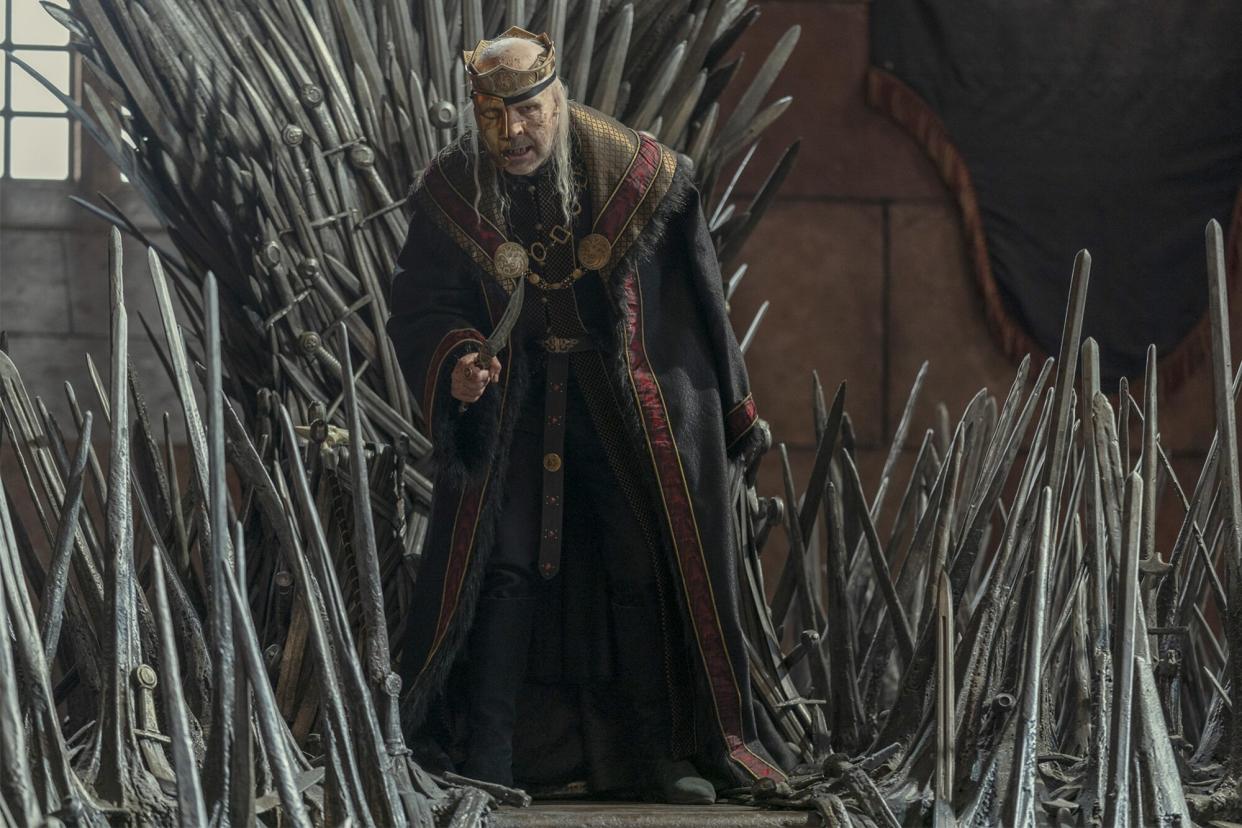
- Oops!Something went wrong.Please try again later.
- Oops!Something went wrong.Please try again later.
Adapting any book will lead to significant changes to the text, but House of the Dragon had some unusual challenges when transferring George R.R. Martin's Fire and Blood to the screen. Co-showrunners Ryan Condal and Miguel Sapochnik had to tease out the reality between conflicting "historical" accounts to create dialogue and scenes only hinted at in the book, which tells the history of the Targaryen dynasty and the tale of the civil war known as the Dance of Dragons. The best changes from the text explain what really happened between the characters, giving new context to both their actions and motivations, while other differences left us scratching our heads. Read ahead to see which we changes we loved — and didn't — in the first season.
Changes that we loved
Paddy Considine's performance as King Viserys Targaryen
For a king of Westeros, Viserys Targaryen, First of His Name, does not really pop on the page. He mostly exists in Fire and Blood to set up the circumstances for the Dance of the Dragons, and doesn't have his brother Daemon's bad boy flair nor his ancestor Jaehaerys' ability to be both a good king and an interesting one. He is the very definition of a seat filler.

Ollie Upton / HBO Paddy Considine's King Viserys in 'House of the Dragon' episode 8.
But in Paddy Considine's masterful hands, Viserys became something far more compelling, an accidental Targaryen king who would be considered mediocre by most of his ancestor's standards and knew it deep down. He wasn't a bad man and could even be considered Westeros' first true girl dad — take that, Ned Stark! — but at every turn, Viserys made bad decisions that bred resentment and turned his family into a swirling cauldron of dysfunction.
From sacrificing his first wife Aemma, the true love of his life, in a misbegotten attempt at having a male heir that left her last moments drenched in blood and horror, to not realizing he was being manipulated by Otto Hightower until it was too late, Viserys was a man slowly drowning but who didn't think he deserved to be saved. Martin himself praised Considine for imbuing Viserys with a complexity that wasn't on the page, and House of the Dragon indeed became a richer show for it.

Ollie Princess Rhaenyra Targaryen (Milly Alcock) seduces Ser Criston Cole (Fabien Frankel).
Confirming the Daemon/Rhaenyra/Criston love triangle
The historical format of Fire and Blood left what really happened between Rhaenyra, her uncle, and her guard up in the air. House of the Dragon settled some lingering mysteries over how the nature of Rhaenyra's relationships with Daemon (Matt Smith) and Ser Criston Cole (Fabien Frankel) helped set the Dance of the Dragons in motion.
While it was only rumor in the book, the show made it plain that yes, Daemon attempted to seduce his niece but got a case of cold feet that sent a hot and bothered Rhaenyra right into the hands of Criston. The knight risked his honor as a member of the Kingsguard for what he thought was her love, but when Rhaenyra rejected his offer to run away and marry him in favor of keeping her claim to the Iron Throne, his heartbreak turned into bitter resentment. Besides confirming their love affair gone wrong, the show also revealed how Alicent won Criston to her side — she prevented him from killing himself after killing Joffrey Lonmouth. Her mercy proved wise, because he became her most loyal ally in the fight between the Greens and the Blacks.
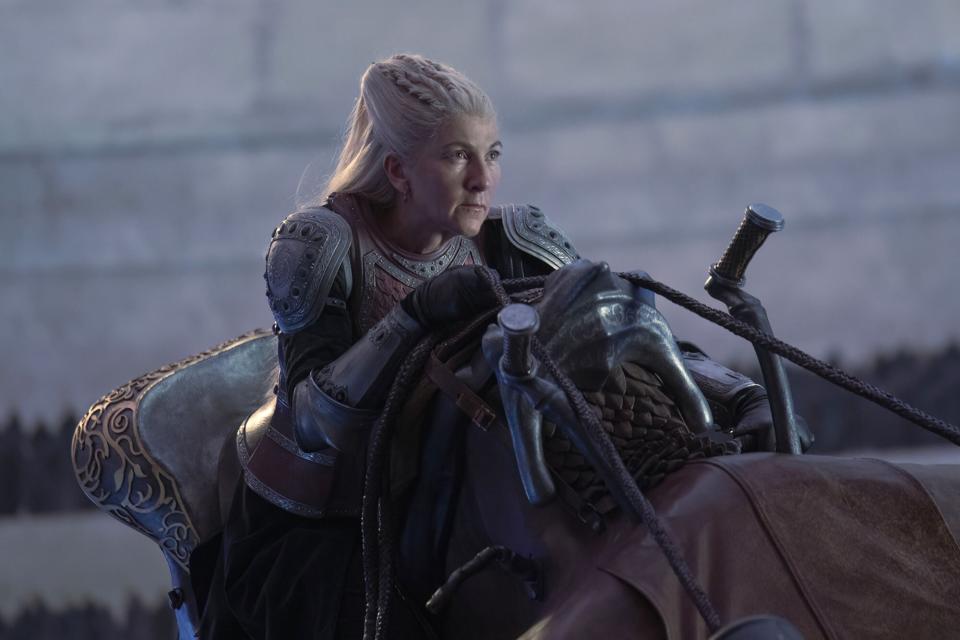
Ollie Upton / HBO Eve Best as Princess Rhaenys Targaryen crashing Aegon's coronation in 'House of the Dragon.'
Rhaenys' big dragon moment
Eve Best's portrayal of Rhaenys Targaryen, the Queen Who Never Was, has been one of the highlights of the whole season, but the penultimate episode really showed why Rhaenys was the Queen that Should Have Been. Whole locked up after her cousin Viserys' death, she coolly dresses down Alicent for her treatment, but realizes that the queen was wily in a way she hadn't expected. Though not a huge fan of Rhaenyra for some very solid reasons, when asked by Alicent to throw her support behind Aegon the Elder's claim, Rhaenys tells the pleading regent, "The word of my house is not fickle."
She proves it at the usurper king's coronation when she bursts through the floor of the dragonpit on her dragon, Meleys, and basically fires the first warning shot that the Dance of the Dragons is about to commence.
Would Daenerys Targaryen have lit that place up without a second thought? Yes. While it would have been gratifying to see Rhaenys unleash a "Dracarys!" in that moment and end civil war before it began, the fact that she didn't fits with the woman we've been watching all season. No one is as accursed as a kin-slayer, and Best makes the conflict on Rhaenys' face evident before she holds her fire — quite literally — and lets her magnificent Red Queen do the talking for her. Meleys lets loose a dragon scream that will haunt the Greens' nightmares for years to come before flying off to inform Rhaenyra what has happened in her absence. But once again, she made clear that the Great Council made the wrong decision.
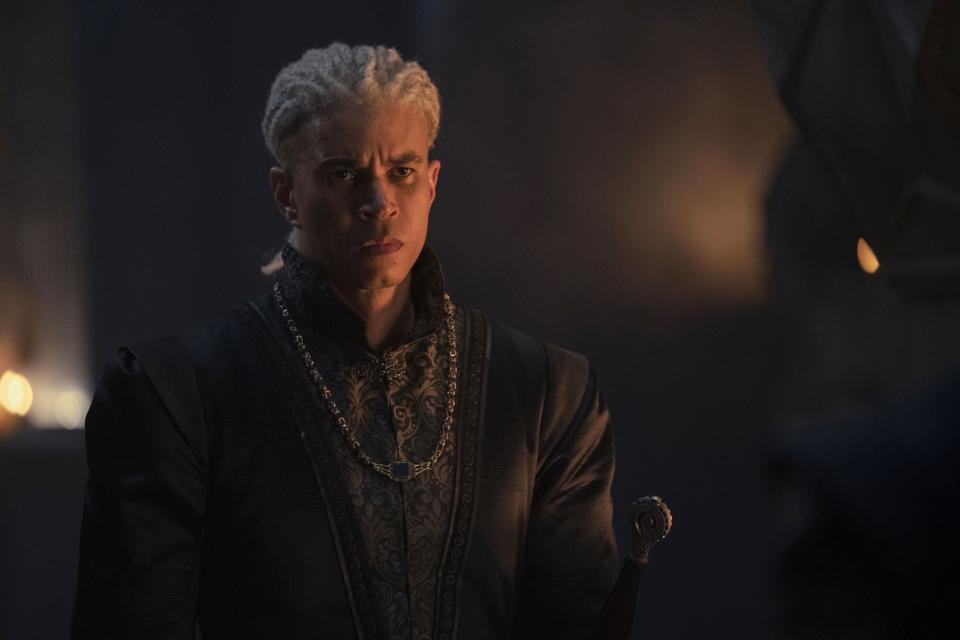
Ollie Upton/HBO John MacMillan
Making Laenor Velaryon biracial
Racist trolls might be upset that House of the Dragon made the Velaryons Black, but not only did it prevent House of the Dragon from being as lily-white as Game of Thrones, it put people of color where they always should have been in the fantasy space. In addition, it made the book's suggestion that Rhaenyra's Velaryon sons were fathered by Harwin Strong all the more obvious, since the children were not biracial like their supposed father, Laenor.
While Laenor doesn't seem to care that Jacaerys, Lucerys, and Joffrey aren't his biological sons, other members of House Velaryon certainly did, leading to tension between Rhaenyra and what should have been her strongest and most powerful allies. While Rhaenys questioned the legitimacy of her grandsons in private, Corlys seemed to only care that they carried his name. That should have been the end of it, but the court continued to talk. Eventually, people lost eyes and heads after having the audacity to ask the rather obvious question of who was the real father of the Velaryon sons. While Aemond Targaryen survived after calling his cousins bastards, Corlys' brother Vaemond wasn't so lucky, and lost his head in an attempt to ensure the Driftmark Throne pass to one of Velaryon blood. Though Westeros doesn't suffer from the same racism that plagues our world, the non-colorblind casting helped highlight how deeply ideas of blood and inheritance influenced their politics.
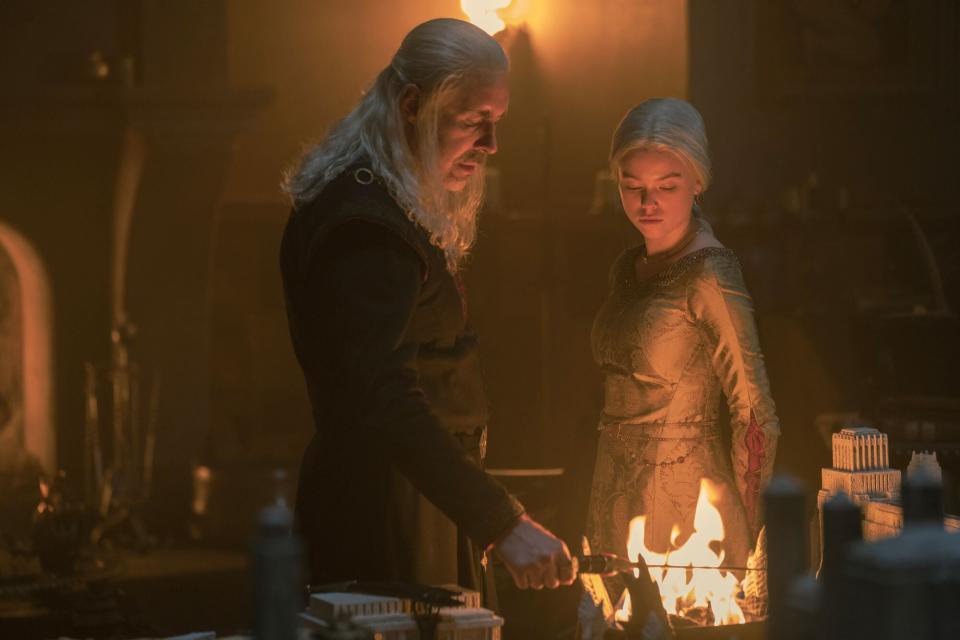
Ollie Upton/HBO King Viserys Targaryen (Paddy Considine) shows his daughter Rhaenyra (Milly Alcock) the secrets of the catspaw dagger on 'House of the Dragon.'
Creating a mythology to the Catspaw dagger
The Catspaw dagger has played a prominent part in the history of Westeros from Game of Thrones' very first season when an assassin used it to try to murder Bran. The weapon helped trigger the War of the Five Kings when Catelyn Stark mistakenly thought the knife belonged to Tyrion Lannister, imprisoning him instead of the dagger's true owner, Littlefinger. Through Littlefinger, Bran came into possession of the dagger. But, seeing everything, Bran knew his sister Arya would put it to better use. Boy, did she when she used its Valarian steel blade to kill the Night King.
That alone would make the dagger legendary enough, but House of the Dragon created a new backstory for the weapon that established its history harkened all the way back to Aegon the Conqueror. Most Thrones fans have heard about the Prince Who Was Promised Prophecy in regards to Jon Snow, but House of the Dragon revealed that besides being engraved on the Catspaw blade, it was the very reason the Targaryens came to Westeros in the first place. Now, the fact that Jon didn't use the dagger himself to end the Long Night does make the fulfillment of the prophecy feel a little meaningless, but House of the Dragon revealed it nevertheless had been influencing the members of House Targaryen for centuries before Jon's birth. It was one of the main reasons Viserys named Rhaenyra heir: he trusted she could be the steady hand Westeros would need in its darkest hour. He just couldn't know that the darkest hour wouldn't come for centuries.
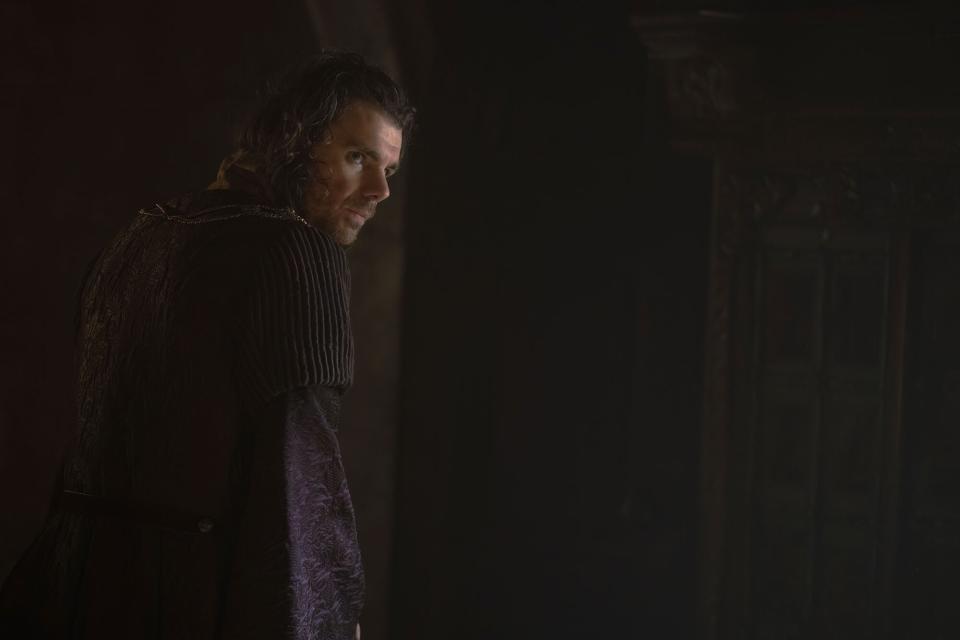
Gary Moyes/HBO
Bringing Larys Strong out of the shadows
Larys Strong popped up here and there in Fire and Blood, but House of the Dragon made clear how nefarious his influence truly was in the Dance of the Dragons. Played by Matthew Needham with an unnervingly gentle sense of menace, Larys' first appearance on screen was a quiet one. It quickly becomes clear, however, that he is a worthy successor not only to Littlefinger, but Varys as well. Unable to join Prince Aegon's name day hunt because of his clubfoot, Larys initially cuts a sympathetic figure — but that's a key to how he's able to manipulate himself into a power position beside the lonely Queen Alicent as her personal master of whisperers. He helped widen the gulf between Alicent and Rhaenyra by telling Alicent that despite Rhaenyra's protestations she remained a maiden, the princess had availed herself of moon tea.
Using knowledge of that betrayal to increase the queen's trust in him, Larys continues to lend a sympathetic ear to the queen's gripes in the absence of her father and uses them to get rid of his father and brother and secure his own place as Lord of Harrenhal. When exactly Larys started extracting sexual favors from Alicent is unknown, but their twisted relationship has made for a fascinating dynamic that was missing from the book.
Changes that left us scratching our heads

Ollie Upton/HBO Paddy Considine, Milly Alcock, Theo Nate
The circumstances surrounding Joffrey Lonmouth's death
Despite being the only man in the Seven Kingdoms who didn't age at all during the course of the first season (maybe it's the Dornish blood), Criston Cole remains the worst for many reasons. But changing the circumstances around his killing of Joffrey Lonmouth makes his remaining on the Kingsguard completely inexplicable.
In Fire and Blood, Joffrey's death at Criston's hands seemed to be an accident that happened during a Tourney celebrating Rhaenyra and Laenor's wedding. Perhaps it was no accident, but killing someone while jousting at a tourney is far different than beating them to death in cold blood during a rehearsal dinner. There is no way Criston would have been allowed to stay on the Kingsguard with such intentional bloodshed staining the reputations of the White Cloaks. Harwin Strong was kicked out of the City Watch for merely giving Criston a well-deserved pop in the mouth. Criston should have been booted as well.
Daeron Targaryen's unexplained absence
In the novel, Alicent gave Viserys four children: Aegon, Helaena, Aemond, and Daeron. In the show, we've only seen the first three (though eagle-eyed viewers noticed there are four bloodlines descending from Alicent and Viserys in the opening credits). Many book readers assumed Daeron had been written out until Martin confirmed that Daeron does exist in the show's history but is being fostered with the Hightowers in Old Town and the show simply hadn't had the time to write him in. It's not unusual for a fourth son to be sent off this way, but how hard would it have been to throw in a line mentioning where Daeron was or to toss another blonde son into a scene somewhere like Laena's funeral? They were able to account for all of Rhaenyra's children even though three of them haven't even spoken. Daeron's absence from season 1 will most likely confuse viewers when he finally pops up later in the show.
Rhaenyra and Laena Velaryon's missing friendship
Considering the first season took place over the span of 20 years, the show could not fit in everything that happens in those many time jumps. But the aspect we missed the most was the friendship between Rhaenyra and Laena Velaryon. We saw a quick glimpse of it when Rhaenyra arrived at Driftmark for her betrothal to Laena's brother, Laenor, but from watching the show, we would never know these two women grew to become the best of friends. By not showing the relationship, Rhaenyra lost out on an opportunity to be humanized more and Laena lost out on some key characterization that could have allowed her tragic death to hit harder than it did. It would also have given context to the depth of loss that Laenor felt at his sister's death and why he decided he would rather flee Westeros to live his life in freedom than stay at the side of his grieving family.
Alicent's misunderstanding of which 'Aegon' Viserys was talking about on his deathbed
Like many royal families, the Targaryens love naming each other after their ancestors, but changing the circumstances of the start of their civil war was a groan-inducing instance.
In the book, Alicent is an ambitious schemer who wants her son on the throne and uses her husband's death and the absence of his chosen heir to usurp the Rhaenyra's claim. In the show, however, she believes that Viserys is talking about their son Aegon instead of Aegon the Conqueror. And with Olivia Cooke welcome shadings to Alicent's characterizations, the mishearing of her dying husband doesn't quite track. The show might have been better off leaving Alicent's motivations less sympathetic and more selfish considering the bloodshed to come.
Subscribe to EW's West of Westeros podcast, which goes behind the making of House of the Dragon and the growing Game of Thrones universe.

